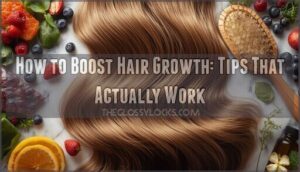This site is supported by our readers. We may earn a commission, at no cost to you, if you purchase through links.
Your hair grows about six inches a year under normal conditions, but most people never hit that mark. The gap between potential and reality comes down to what you feed your body, how you treat your scalp, and whether you’re unknowingly sabotaging growth with harsh products or chronic stress.
Breaking free from slow growth means taking control of the fundamentals—nutrition that actually reaches your follicles, a routine that protects instead of damages, and targeted treatments that work with your biology instead of against it. Once you understand what your hair needs to thrive, you can build a strategy that delivers real results.
Table Of Contents
- Key Takeaways
- Fuel Hair Growth With The Right Nutrition
- Build a Hair Care Routine That Works
- Prioritize Scalp Health for Faster Growth
- Make Lifestyle Changes to Boost Growth
- Try Supplements and Topical Treatments
- Frequently Asked Questions (FAQs)
- How can I make my hair grow faster and stronger?
- How to stimulate hair growth at home?
- How to promote healthy hair growth?
- How can I make my hair grow faster naturally?
- How can I grow hair faster naturally?
- What stimulates hair growth speed?
- How can I increase my hair growth and thickness?
- How do I encourage my hair to grow?
- Can stress lead to permanent hair loss?
- Are there seasonal impacts on hair growth?
- Conclusion
Key Takeaways
- Your hair’s growth potential hinges on three controllable factors: feeding your follicles with protein, iron, and omega-3s, protecting strands from heat damage and harsh products, and boosting scalp circulation through daily massage.
- Most hair loss from stress is temporary—chronic cortisol disrupts your follicle cycle, but managing stress through meditation and exercise and proper sleep lets growth bounce back naturally.
- Supplements like biotin and vitamin D fill nutritional gaps while topical minoxidil extends growth phases by widening blood vessels, but consistency over months matters more than quick fixes.
- Small daily choices—swapping sulfate-free shampoo, limiting heat to 300-350°F, and cutting sugar and trans fats—compound into measurable thickness and length over time.
Fuel Hair Growth With The Right Nutrition
Your hair doesn’t grow in a vacuum—it needs the right fuel to thrive.
Eating a balanced diet rich in protein, iron, and vitamins is one of the best ways to prevent hair breakage and keep strands resilient.
What you eat directly impacts how strong, healthy, and fast your hair grows.
Here’s what you need to load up on and what you should cut out.
Lean Proteins and Hair Health
Your hair is built on protein—specifically keratin—and without enough in your diet, strands weaken and growth stalls.
Aim for lean proteins like chicken, fish, eggs, or legumes daily to fuel keratin production and maintain amino acid balance. This steady nutrient absorption strengthens each strand from the inside out, giving you the foundation for real, lasting hair growth.
For more insight into the role of protein in hair health, learn how a balanced diet can prevent thinning and support growth.
Foods High in Omega-3 Fatty Acids
Omega-3s tame inflammation at the scalp and nourish hair follicles from within. Fatty fish like salmon, mackerel, and sardines deliver powerful EPA and DHA—aim for two servings weekly.
Plant-based warriors can tap into flaxseed, chia seeds, and walnuts for ALA, though your body converts only a fraction to active forms.
Don’t skip these nutrient-dense, omega-rich foods—they’re your secret weapon for thicker, stronger strands. Learning more about the specific animal and plant sources of omega-3s can help you make the best choices for your hair health.
- Salmon offers around 2,150 mg of EPA and DHA per serving
- Mackerel provides about 4,580 mg per 3.5-ounce portion
- Sardines deliver roughly 1,463 mg of omega-3 fatty acids
- Flaxseed yields about 2,350 mg of ALA per two tablespoons
- Walnuts contain about 2,570 mg of ALA per ounce
Essential Vitamins and Minerals for Hair
Your body demands a Vitamin Balance arsenal to fuel follicle support and scalp health.
Vitamin A drives sebum production—aim for 700-900 mcg daily—while vitamin C shields follicles from oxidative damage and boosts iron absorption.
Biotin fortifies keratin structure, and iron and zinc deliver oxygen to hungry roots.
Mineral deficiency tanks hair nutrition fast, so load up on leafy greens, eggs, and fortified foods.
Foods to Avoid for Healthy Hair
Just as vitamins power hair growth, certain foods sabotage it. Cut these culprits to protect your follicles:
Heat styling ranks high among hair health threats, so mastering how to detangle thick hair gently before applying heat can minimize breakage.
- Fatty Food Impact — Trans fats in fried meals clog follicles and trigger scalp inflammation.
- Sugar Effects — Sweets spike insulin, stressing roots and weakening strands.
- Mercury Exposure — Swordfish disrupts growth cycles.
- High Salt Risks — Sodium dehydrates your scalp.
- Dairy Overload — Heavy cream raises androgens, worsening shedding.
Build a Hair Care Routine That Works
Your hair care routine can make or break your growth goals.
The way you wash, condition, and style matters just as much as what you eat.
Here’s how to stop sabotaging your strands and start treating them right.
Gentle Cleansing and Washing Techniques
You’re in control of your hair growth journey, and it starts with sulfate free cleansing. Use a gentle shampooing approach every 2-3 days, massaging your scalp with fingertips for 60 seconds to boost circulation.
Rinse with lukewarm water, then finish with a cool water rinse for 10-20 seconds to seal cuticles and lock in shine. Your hair care routine deserves this foundation.
Conditioning for Strength and Shine
Deep conditioning transforms weak strands into strong, shiny hair. Apply a moisture balance treatment weekly, focusing on mid-lengths to ends where cuticle repair matters most.
Look for keratin-based hair masks that rebuild damaged areas while shine enhancers seal the surface. Leave it on for 10-15 minutes, then rinse—your hair care routine just leveled up for real hair growth and strength.
Protecting Hair From Heat Damage
Heat styling tips start with one non-negotiable rule: always shield your strands with thermal protection before any hot tool touches them. A silicone-based spray creates a barrier against heat tool safety risks up to 450°F, preventing hair breakage and locking in moisture.
For real hair damage prevention, keep temperatures between 300-350°F and let sections cool between passes—your hair growth tips depend on it.
Using The Right Tools and Brushes
Your tools shape your hair’s future—choose wisely. The right brush materials and comb types protect strands while detangling tools minimize breakage during hair styling and maintenance:
- Boar bristle brushes distribute scalp oils naturally for added shine on dry hair
- Nylon brushes gently detangle fragile strands without moisture damage
- Paddle brushes reduce snagging on thick hair with wide-spaced bristles
- Vented hair dryers speed up drying while limiting heat exposure
- Scalp massagers boost circulation to support hair growth and hair health
Smart hair care products start with the basics.
Prioritize Scalp Health for Faster Growth
Your scalp isn’t just where your hair sits—it’s the foundation that controls how fast and healthy your hair actually grows.
When you treat your scalp right, you’re giving every strand what it needs to thrive from the root up.
Here’s how to take control of your scalp health and activate faster growth.
The Power of Scalp Massage
Want faster growth? Massage your scalp. Daily sessions boost blood flow to hair follicles, delivering oxygen and nutrients that fuel stronger strands. Five-minute circular motions with your fingertips do the trick—no fancy tools required. Beyond the growth boost, you’ll melt tension and sleep better.
| Technique | Duration | Key Benefit |
|---|---|---|
| Circular fingertip motions | 5 minutes daily | Enhanced microcirculation |
| Crown-focused pressure | 2–5 minutes | Nutrient delivery to follicles |
| Evening sessions | 15–20 minutes | Deeper relaxation and stress relief |
Consistency is everything. Pair massage with clean hands and a warm towel for maximum impact.
Keeping Your Scalp Clean and Balanced
Your scalp’s pH balance controls everything—keep it between 4.5 and 5.5, and you’ll dodge inflammation, excess oil, and irritation. Gentle cleansing 2–3 times weekly strips buildup without wrecking natural oils.
Oily hair? Wash every 1–2 days. Dry or curly? Stretch it to 3–7 days. Pair pH-balanced shampoos with scalp massage and oil regulation tactics for scalp health management that actually yields benefits.
Treating Common Scalp Conditions
A clean scalp isn’t bulletproof—dandruff, fungal infections, and contact dermatitis disrupt hair follicle care.
Zinc pyrithione shampoos crush flaking, while ketoconazole combats stubborn fungal remedies for itchy scalp relief.
Scalp psoriasis demands salicylic acid to soften thick scales. Ringworm? You’ll need oral antifungals plus selenium sulfide washes.
Persistent symptoms warrant a dermatologist visit—proper scalp treatment paired with scalp massage accelerates recovery and unlocks growth.
Make Lifestyle Changes to Boost Growth
Your daily habits shape your hair growth more than you might think.
Stress, sleep, and even the sun can either fuel growth or sabotage it.
Here’s how to take control and create the right environment for your hair to thrive.
Managing Stress to Prevent Hair Loss
Chronic stress floods your body with cortisol, pushing hair follicles into a resting phase that stalls growth. Mindful breathing and ten-minute daily meditation cut anxiety relief fast, lowering stress hormones that trigger shedding.
Chronic stress floods your body with cortisol, stalling hair growth—but ten-minute daily meditation cuts stress hormones fast
Regular aerobic exercise boosts scalp health by improving blood flow, while journaling helps you process emotions before they sabotage your hair growth goals.
Getting Enough Sleep and Staying Hydrated
Your sleep patterns and water intake fuel hair growth more than you realize. Aim for 7 to 9 restful nights each week—deep sleep stages trigger protein synthesis that rebuilds follicles.
Sip around 8 cups of water daily to keep strands flexible and support scalp health. Consistent hydration tips: carry a reusable bottle and munch hydrating fruits to deliver nutrients through your scalp’s circulation.
Protecting Hair From Environmental Damage
Beyond sleep and hydration, your hair faces daily assaults from sun, smog, and seasonal shifts. A solid hair care routine shields strands from UV rays with protective leave-ins and wide-brimmed hats. Pollution defense starts with sulfate-free washes, while chlorine removal requires a quick rinse before diving in. Wind shielding and humidity control? Lock moisture with lightweight serums.
- UV protection: Apply leave-in conditioners with built-in filters before heading outdoors
- Pollution defense: Wash with gentle shampoo to sweep away airborne grime
- Chlorine removal: Rinse hair with clean water pre-swim to block chemical absorption
- Humidity control: Seal cuticles with anti-frizz products to stop breakage
These hair growth techniques and hair breakage prevention tactics keep your scalp health and treatment on track for stronger, faster gains in hair health and wellness.
Try Supplements and Topical Treatments
Sometimes your hair needs more than just good habits and clean eating—it needs targeted help.
Supplements can fill nutritional gaps, while topical treatments work directly on your scalp to kickstart growth. Here’s what actually works and when you should bring in a professional.
Biotin, Vitamin D, and Other Key Supplements
Biotin benefits include strengthening keratin for shinier, more resilient strands—adults need about 30 micrograms daily from eggs or nuts.
Vitamin D’s role in the hair growth cycle matters too; low levels can trigger shedding, so aim for 600-800 IU through sunlight or fortified foods. Iron and zinc tackle nutrient deficiencies that cause thinning, but check supplement interactions with your doctor first.
Minoxidil and How It Promotes Growth
Minoxidil effects include extending growth phases and waking dormant hair follicles on your scalp. This FDA-approved scalp treatment widens blood vessels to deliver more nutrients where you need them most.
You’ll see regrowth patterns emerge after consistent daily use for months—foam formulations work without irritation. Just know your genetics determine how well minoxidil converts to its active form for real hair regrowth.
Essential Oils as Natural Alternatives
Essential oils offer aromatherapy benefits and natural hair remedies when you dilute them properly. Mix 2-3 drops of lavender or tea tree oil per teaspoon of carrier oil like castor oil, then work it into your scalp with massage techniques that stimulate hair follicles.
These oil dilution methods and essential oil blends support scalp health—just patch test first to avoid irritation.
When to Consult a Doctor
Sometimes hair loss prevention hits a wall—that’s when health professional guidance matters most.
Book a doctor visit if you notice these hair loss symptoms:
- Sudden bald patches appearing overnight or worsening rapidly over days
- Scalp pain, redness, or flaking suggesting hair and scalp conditions needing treatment
- Hair shedding in clumps after starting new hair growth supplements and vitamins
- Unexplained thinning despite trying multiple hair problems and solutions
- Persistent symptoms that don’t improve after basic medical consultation attempts
Frequently Asked Questions (FAQs)
How can I make my hair grow faster and stronger?
You need a three-pronged attack: fuel your follicles with lean protein intake, iron and zinc, then massage your scalp daily for blood flow, and protect strands from heat damage for faster regrowth.
How to stimulate hair growth at home?
You can boost hair growth at home through scalp massage, DIY masks with castor oil, proper hair nutrition, and consistent scalp care routines.
Natural remedies and home treatments work when paired with patience.
How to promote healthy hair growth?
Healthy hair growth starts with solid nutrition—protein-rich foods, omega-3s, and iron-packed meals fuel follicles.
Regular scalp massage improves circulation, while gentle hair care products and stress management create the foundation your strands need to thrive.
How can I make my hair grow faster naturally?
Your scalp is like soil—feed it right, treat it gently, and results follow.
Focus on protein intake, scalp massage, and vitamins through a healthy diet.
Natural remedies and proper scalp care promote hair growth and thickness.
How can I grow hair faster naturally?
You can’t force follicles overnight, but strong nutrition for hair growth—lean proteins, omega-3s, vitamins—plus scalp massages and hair growth supplements like biotin create conditions where faster regrowth and healthy hair thickness naturally follow.
What stimulates hair growth speed?
Picture your follicles as tiny factories. Blood circulation delivers nutrients like biotin and iron that fuel cell regeneration through growth phases.
Balanced hormones keep keratin production humming while minoxidil awakens dormant follicles.
How can I increase my hair growth and thickness?
You can boost hair growth and thickness by eating lean proteins and omega-3s.
Using minoxidil as directed, massaging your scalp regularly, taking biotin or vitamin D if deficient, and protecting strands from heat damage can also be beneficial.
How do I encourage my hair to grow?
You can’t force your strands to sprint, but hair growth tips like scalp stimulation, nutrient-rich hair nutrition and diet, and minoxidil treatments awaken dormant follicle care potential for measurable hair thickness improvements.
Can stress lead to permanent hair loss?
Good news: stress-triggered hair loss usually isn’t permanent.
Telogen effluvium causes temporary shedding when stress hormones like cortisol disrupt your hair follicle cycle. Manage stress effectively, and your scalp health—and hair growth—usually bounce back.
Are there seasonal impacts on hair growth?
Yes—your hair actually grows faster in summer and spring as follicles spend more time in their active growth phase.
You’ll notice increased shedding in autumn as those follicle phases naturally shift.
Conclusion
Sometimes it’s the tiny changes—swapping out one harsh shampoo, adding an extra serving of salmon, pausing to massage your scalp on a busy morning—that create the biggest shifts.
When small choices line up, you stop just hoping for longer hair and start seeing it happen. That’s how to boost hair growth: it’s both rebellion against what’s holding you back and an embrace of what you can control. Own those moments, and let your healthiest hair grow forward.












